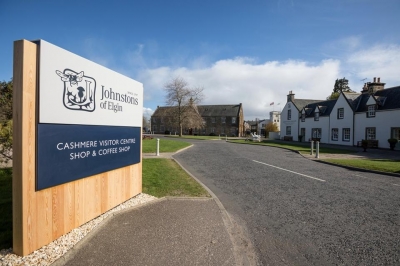
Fast Fashion Is Being Left In The Slow Lane: Why The Days Of Cheap Clothes Might Be Over Forever
Andrew Busby Contributor - Retail: I write about consumer and tech trends & the challenges in retail
Johnstons of Elgin are at one end of the fashion marketplace - established in 1797, and is now the largest textile manufacturer left in the U.K. It's luxury cashmere garments being made in the same mill that originally produced linen, flax and oatmeal amongst others. It stands very firmly at the luxury end of the market, a single cashmere sweater retailing for upwards of £250. It's definitely not for those on a tight budget.
Like all 'non-essential' businesses it has been forced to temporarily close, its 1,000 workers being furloughed along with many others in the industry. The mill stands idle. For the time being at least.
But one thing that sets it apart from many of its compatriots in the fashion industry, is that Johnstons is also a textile manufacturer, meaning that at the mill in Elgin, it makes all the garments which it retails. In other words, it has a direct relationship with its entire workforce, many of whom come from the same north-east area of Scotland, in the shadow of the Cairngorms National Park.
Luxury is intrinsically about how the garment is made, it's about the values of the manufacturer
Simon Cotton, chief executive, Johnstons of Elgin
Sustainability is at the core of the company's DNA, maintaining that by buying better quality garments and wearing them for longer reduces our clothing consumption and thereby our impact on the environment.
The business sources its raw materials primarily from Mongolia, and keeps a very close working relationship with the herders, supporting initiatives to support and train them, in addition to maintaining their livelihoods, through the Sustainable Fibre Alliance.
Slow Luxury, Fast Fashion
Meanwhile, at the other end of the market, things couldn't be more different. The gulf between slow luxury and fast fashion couldn't be greater these days. Workers in factories in places such as Bangladesh being laid off with no prospect whatsoever of any social support as contracts for the supply of garments by western retailers are cancelled or suspended.
The cost to Bangladesh alone is estimated to be over £2 billion. And it is the manufacturers who bear all the risk as they are not allowed to invoice until the goods have been shipped. Seems a little unfair? You bet. Some retail online operations are being kept open but with limited demand, and to sell stock already shipped, after all, what's the point of purchasing a new outfit now?
Simon Cotton has been chief executive at Johnstons of Elgin for seven years, and I asked him if he felt that this was heralding a shift in consumer behaviour away from the kind of fashion consumerism we have witnessed up until now, he told me that, "we are still addicted to those bargains and low prices".
And of the behaviour of some of the fashion retailers, "It will be a huge shock to the system, with a lot of brands going out of business. The commercial drive to be ruthless has never been greater".
It has to start with lower consumption, that cycle has to be broken but even this (coronavirus) may not be enough to break it
Simon Cotton, chief executive, Johnstons of Elgin
Johnstons of Elgin invites people to tour its facility in Elgin and estimates that after having a tour, the basket size for each customer at least doubles. Sadly, the same could not be said if we were to tour the factories in Bangladesh which manufacture the very clothes we are all content to buy on the high street at knock down prices.
Prior to the coronavirus pandemic, it seemed that sustainability was the only talk in town when discussing fast fashion. The direction of travel was beginning to shift away from mass fashion consumerism and brands were having to re-think their business models for 2030 and beyond.
That kind of timeline now seems laughable. Most felt that this process would take years, but what the coronavirus has done is to shrink what might have happened in years to just weeks. And as agreements are torn up, putting suppliers out of business, the big question is, by the time we return to some semblance of normality, like their suppliers, just how many of those brands will have joined them in disappearing?
The days of cheap, fast fashion might be over forever. Suddenly that £250 sweater seems a bargain.
Andrew Busby - I am a retail analyst, writer, and keynote speaker on retail challenges and trends with a focus on consumer behavior, customer experience, and technology disruption
